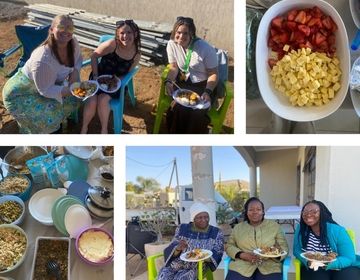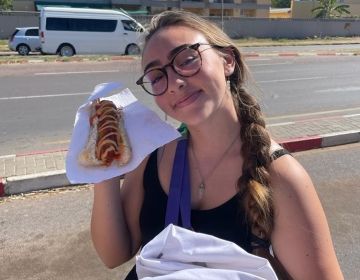Visibility in Botswana
For lighter skinned students, it is a foreign feeling to leave a country where you are a member of the majority race for one where you are not only a minority, but a rarity. In the United States, I am not an anomaly, so I am comfortable shopping, walking, and using public transportation without eliciting stares, whispers, gasps, and unwanted attention. Here in Botswana, however, the social environment is quite different; because of my light skin color, I am immediately (and correctly) picked out as a foreigner, as a tourist, and as an Amerian. Most commonly, this results in stares, flirtations, comments and touches from men, and can (though rarely) culminate in awkward pick-up lines (such as marriage proposals) and inappropriate physical contact.
By far the biggest challenge for the visible women in this group has been interacting with local men. As Botswana is a patriarchal society, this strongly influences what is deemed culturally appropriate when it comes to interactions between men and women. Oftentimes, conversations with local men can imply that there is a power imbalance between you and them and that, as you are not from here, they intrinsically feel they have more control over the situation, as well as a natural claim to you. This can be a difficult adjustment when coming from a culture that (generally) encourages a great deal of respect when men interact and/or flirt with women in public.
Personally, I think I have had one of the worst experiences with men here, as it is difficult for me to be firm and say no. This has resulted in repeated unwanted physical advances from taxi drivers (such as being kissed on the mouth), being touched on the neck and hands by men on the street, being told “I love you”, and being driven away with twice. It is important to note, however, that these examples are VERY extreme, and have not happened to many female students here, nor did they happen regularly to me. The most common attention I received here for being visible was smiles, compliments, and winks.
To combat this, I wear a fake wedding ring, and use this if men become too aggressive; I have found that locals often respect a fictional husband more than they do me. I would also recommend not taking what men say too seriously (it can often be very illicit), being very firm if you are not interested, declining to give phone numbers or personal information (such as where you’re heading next), being aware of where you are in relation to strange men at all times, and walking with other students or friends after dark.
Another challenge with visibility here is being picked out as a tourist, which can range from embarrassing to dangerous. If you are already uncertain of how to use public transport or how to use the local currency, it can heighten embarrassment and uncertainty when bystanders are openly staring or whispering. It can prove dangerous if you are visible at country borders (such as Namibia or Zimbabwe) or at the station, both of which are highly populated by men, and where being white can result in higher charges. Specifically, taxi drivers may overcharge you if you are not aware of prices (special taxis are NEVER more than thirty pula), and border officers may overcharge your driver if he is seen with a group of young white people.
However, being visible here can often result in positive special treatment. For example, locals are usually very helpful, and taxi drivers will often drop you off right at the doors of clinics if you are polite and obviously lost. On khombis, if you are unsure of where to go, strangers will often tell the driver (and you) when and where to get off! People are very willing to help and can be very friendly and complimentary- interested in where you are from and what has brought you to Botswana.
Related Posts
Summer Community Public Health
This summer, the village of Dikgathong came alive with the vibrant and impactful Community Health Expo, organized by the Council on International Educational Exchange (CIEE) and the University of Botswana... keep reading

Botswana Braais: The Heartbeat of Social Unions
Authored by: Ruby Pitinyane Botswana, a country known for its quality beef production, vast landscapes and rich cultural heritage, holds a special place for the tradition of braais. A braai... keep reading

What I wish I knew before coming
Written by Kat Laird. My name is Katherine Laird and I was part of the Summer 2023 in the Community Public Health Program. Below is what I wish I knew... keep reading